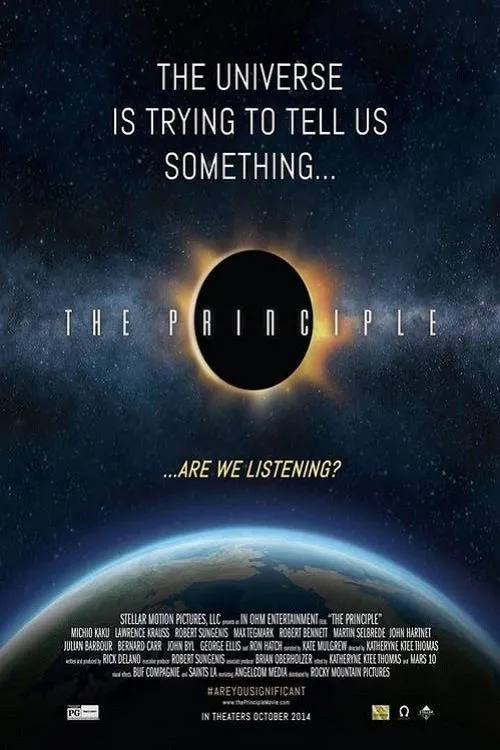The Principle

Plot
Set against the backdrop of the latest findings in cosmology, "The Principle" is a documentary film that dares to question the foundational assumption of the modern scientific worldview. The Copernican Principle, which posits that the Earth occupies no special or favored position in the universe, has been the cornerstone of scientific progress for centuries. However, as we delve deeper into the mysteries of the cosmos, a growing number of scientists and thinkers are beginning to challenge this notion. The film takes us on a journey to the cutting-edge of cosmological research, where scientists are uncovering evidence that suggests our universe may not be as random and impersonal as we once thought. From the Big Bang to the mysteries of dark matter and dark energy, the film explores the latest discoveries that are forcing us to rethink our understanding of the cosmos. At the heart of the film is the story of Claudio D'Ambrosio, an Italian astrophysicist who became increasingly frustrated with the limitations of the Copernican Principle. D'Ambrosio's research challenged the idea that our universe is a random, featureless expanse, and instead, suggested that the Earth may occupy a unique position in the cosmos. His findings sparked a heated debate among scientists, with some accusing him of promoting pseudoscience. Meanwhile, physicist and astronomer Lawrence Krauss offers his perspective on the implications of D'Ambrosio's work. According to Krauss, the Copernican Principle has been the driving force behind two major scientific revolutions - the Copernican Revolution and Relativity - and he believes that D'Ambrosio's work may be the catalyst for a third. Krauss's enthusiasm is matched only by his concern, as he warns that the challenge to the Copernican Principle could have far-reaching consequences for our understanding of the universe. The film takes a nuanced approach, presenting not only the views of scientists but also those of dissidents and mavericks. We meet individuals who have spent years pouring over ancient texts and scriptures, searching for clues that may shed light on the mysteries of the cosmos. Their perspectives are often at odds with the prevailing scientific view, but they offer a fascinating glimpse into the ways in which our cultural and religious views of reality are interconnected. One such individual is David Talbott, a historian and researcher who believes that the ancient Egyptians and Greeks left behind secrets about the nature of the universe. Talbott's work has been met with skepticism by some, but his passion and conviction are undeniable. He argues that the ancient civilizations possessed knowledge of the cosmos that has been lost to us, and that this knowledge may yet hold the key to understanding the mysteries of the universe. As "The Principle" unfolds, we see the ways in which the challenge to the Copernican Principle is resonating with the public. We meet individuals from all walks of life who are grappling with the implications of D'Ambrosio's work and the prospect of a universe that may be more structured and directed than we once thought. For some, this new perspective on the universe is exhilarating, offering a glimpse into the possibility of a divine or intelligent force at work in the cosmos. For others, it is unsettling, forcing them to confront the possibility that the Earth and our lives may occupy a special place in the universe after all. Throughout the film, the interviews with scientists, dissidents, and mavericks are interspersed with stunning visuals of the cosmos. We see breathtaking images of distant galaxies, galaxy clusters, and nebulae, each one a testament to the awe-inspiring beauty and complexity of the universe. These visuals serve as a reminder of the mysteries that still surround us, and of the ways in which our understanding of the cosmos is still evolving. Ultimately, "The Principle" is a thought-provoking and unsettling film that challenges us to rethink our assumptions about the universe. It is a testament to the power of human curiosity and the ways in which science and inquiry can change our understanding of reality. As we ponder the implications of D'Ambrosio's work and the prospect of a new scientific revolution, we are forced to confront the possibility that the universe may be more than just a random and featureless expanse after all.
Reviews
Recommendations



